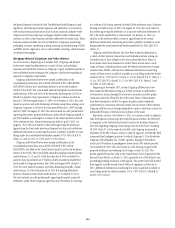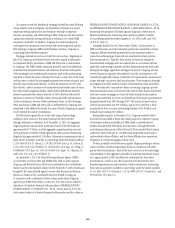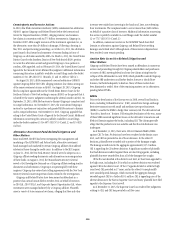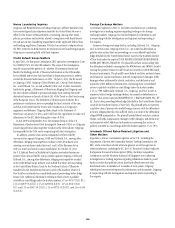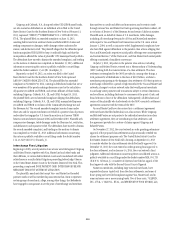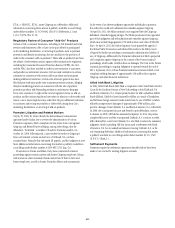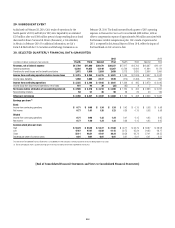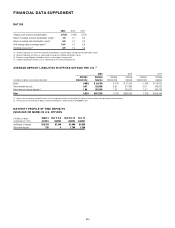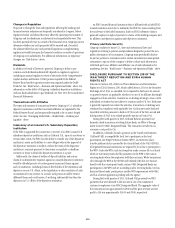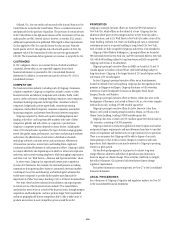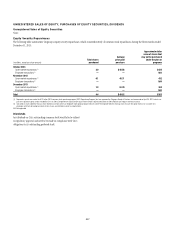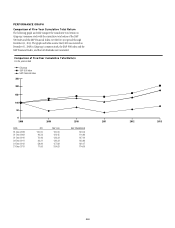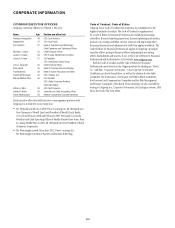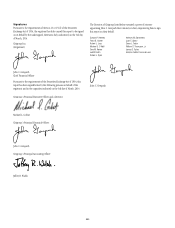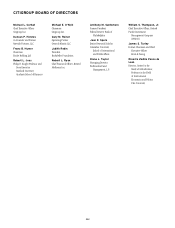Citibank 2013 Annual Report Download - page 332
Download and view the complete annual report
Please find page 332 of the 2013 Citibank annual report below. You can navigate through the pages in the report by either clicking on the pages listed below, or by using the keyword search tool below to find specific information within the annual report.314
SUPERVISION, REGULATION AND OTHER
SUPERVISION AND REGULATION
Citigroup is subject to regulation under U.S. federal and state laws, as well as
applicable laws in the other jurisdictions in which it does business.
General
As a registered bank holding company and financial holding company,
Citigroup is regulated and supervised by the Federal Reserve Board.
Citigroup’s nationally chartered subsidiary banks, including Citibank, N.A.,
are regulated and supervised by the Office of the Comptroller of the Currency
(OCC) and its state-chartered depository institution by the relevant state’s
banking department and the Federal Deposit Insurance Corporation (FDIC).
The FDIC also has back-up enforcement authority for banking subsidiaries
whose deposits it insures. Overseas branches of Citibank, N.A. are regulated
and supervised by the Federal Reserve Board and OCC and overseas subsidiary
banks by the Federal Reserve Board. Such overseas branches and subsidiary
banks also are regulated and supervised by regulatory authorities in the
host countries. In addition, the Consumer Financial Protection Bureau
(CFPB) regulates consumer financial products and services.
A U.S. financial holding company and the companies under its control
are permitted to engage in a broader range of activities in the U.S. and
abroad than permitted for bank holding companies and their subsidiaries.
Unless otherwise limited by the Federal Reserve Board, financial holding
companies generally can engage, directly or indirectly in the U.S. and
abroad, in financial activities, either de novo or by acquisition, by providing
after-the-fact notice to the Federal Reserve Board. These financial activities
include underwriting and dealing in securities, insurance underwriting
and brokerage and making investments in non-financial companies for a
limited period of time (as long as Citi does not manage the non-financial
company’s day-to-day activities, and its banking subsidiaries engage only in
permitted cross-marketing with the non-financial company). If Citigroup
ceases to qualify as a financial holding company, it could be barred from new
financial activities or acquisitions, and could have to discontinue the broader
range of activities permitted to financial holding companies.
Citi is permitted to acquire U.S. depository institutions, including out-of-
state banks, subject to certain restrictions and the prior approval of federal
banking regulators. In addition, intrastate bank mergers are permitted
and banks in states that do not prohibit out-of-state mergers may merge.
A national bank also can generally establish a new branch in any state,
and state banks can generally establish a new branch in another state, in
either case to the same extent as banks organized in the state where the new
branch is to be established. However, all bank holding companies, including
Citigroup, must obtain the prior approval of the Federal Reserve Board before
acquiring more than 5% of any class of voting stock of a U.S. depository
institution or bank holding company. The Federal Reserve Board must also
approve certain additional capital contributions to an existing non-U.S.
investment and certain acquisitions by Citigroup of an interest in a non-U.S.
company, including in a foreign bank, as well as the establishment by
Citibank, N.A. of foreign branches in certain circumstances.
For more information on U.S. and foreign regulation affecting Citigroup
and its subsidiaries, see “Risk Factors” above.
Other Bank and Bank Holding Company Regulation
Citigroup and its banking subsidiaries are subject to other regulatory
limitations, including requirements for banks to maintain reserves against
deposits, requirements as to risk-based capital and leverage (see “Capital
Resources” above and Note 19 to the Consolidated Financial Statements),
restrictions on the types and amounts of loans that may be made and
the interest that may be charged, and limitations on investments that
can be made and services that can be offered. The Federal Reserve Board
may also expect Citigroup to commit resources to its subsidiary banks in
certain circumstances. Citigroup is also subject to anti-money laundering
and financial transparency laws, including standards for verifying client
identification at account opening and obligations to monitor client
transactions and report suspicious activities.
Securities and Commodities Regulation
Citigroup conducts securities underwriting, brokerage and dealing activities
in the U.S. through Citigroup Global Markets Inc. (CGMI), its primary
broker-dealer, and other broker-dealer subsidiaries, which are subject to
regulations of the SEC, the Financial Industry Regulatory Authority and
certain exchanges, among others. Citigroup conducts similar securities
activities outside the U.S., subject to local requirements, through various
subsidiaries and affiliates, principally Citigroup Global Markets Limited
in London (CGML), which is regulated principally by the U.K. Financial
Conduct Authority, and Citigroup Global Markets Japan Inc. in Tokyo, which
is regulated principally by the Financial Services Agency of Japan.
Citigroup also has subsidiaries that are members of futures exchanges and
are registered accordingly. In the U.S., CGMI is a member of the principal
U.S. futures exchanges, and Citigroup has subsidiaries that are registered
as futures commission merchants and commodity pool operators with the
Commodity Futures Trading Commission (CFTC). On December 31, 2012,
Citibank, N.A., CGMI, and Citigroup Energy Inc., registered as swap dealers
with the CFTC. On October 9, 2013, CGML also registered as a swap dealer
with the CFTC. CGMI is also subject to Rule 15c3-1 of the SEC and Rule 1.17
of the CFTC, which specify uniform minimum net capital requirements.
Compliance with these rules could limit those operations of CGMI that
require the intensive use of capital, such as underwriting and trading
activities and the financing of customer account balances, and also limits
the ability of broker-dealers to transfer large amounts of capital to parent
companies and other affiliates. See also “Capital Resources—Citigroup
Broker-Dealer Subsidiaries” and Note 19 to the Consolidated Financial
Statements for a further discussion of capital considerations of Citigroup’s
non-banking subsidiaries.


